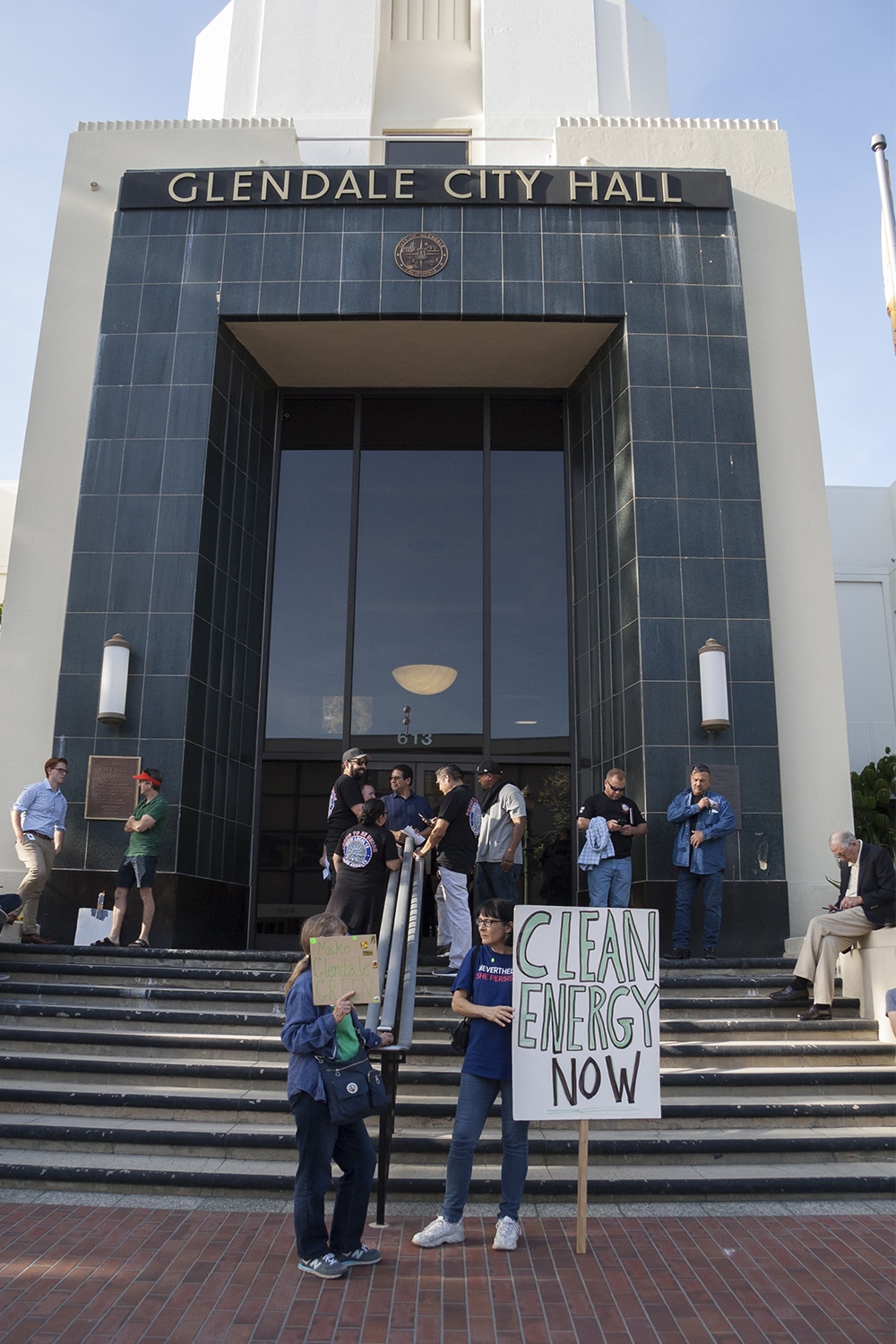
After a nine-hour meeting, the Glendale City Council moved not to certify an Environmental Impact Report (EIR) produced by Glendale Water and Power (GWP) in a 4–1 vote April 11. The meeting was the longest on record since the beginning of 2018. If passed, the EIR would have brought Glendale a step closer to repowering the Grayson Power Plant. Instead, the City Council opted to temporarily table the EIR and search for an unbiased study of alternatives to repowering Grayson before their meeting July 10.
The Grayson Power Plant has been the source of 40 unplanned power outages since May 2015, according to the EIR. GWP has been attempting to repower the plant since 2014, according to the project’s official website. GWP has also been pursuing new development at other sites. In March 2018, Glendale’s City Planning Commision rejected GWP’s efforts to construct a biogas plant at the Scholl Canyon Landfill.
A group of more than 400 Glendale residents with the Glendale Environmental Coalition (GEC) gathered outside Glendale City Hall before the April 11 meeting to protest efforts to repower Grayson. Daniel Brotman — a Glendale Community College economics professor who formed the GEC — headed the group of protestors. Among the group were Naeiri Khachkian and Mike Van Gordor, members of the Glendale Tenants Union.
“There’s no reason to continue to spend money on outdated energy sources. Oil and coal are not where the city of Glendale, which prides itself on being clean, should be,” Khachkian said.
 The group of protestors chanting “city council vote green” and “make Glendale green” engulfed the block at 5:30 p.m. and filled City Council chambers moments into the 6 p.m. meeting.
The group of protestors chanting “city council vote green” and “make Glendale green” engulfed the block at 5:30 p.m. and filled City Council chambers moments into the 6 p.m. meeting.
“We don’t need to spend 500 million dollars on outdated technology that’s going to handcuff us to the same exact outdated technology 40 years from now,” Van Gordor said.
During the meeting, the GWP Commission presented on the EIR’s findings, outlining a possible $500 million project to repower Grayson. The GWP covered key concerns including Grayson’s reliability, cost and efficiency, along with research on potential environmental impact.
Evan Gillespie, director of the Sierra Club’s My Generation Campaign; Angela Johnson Meszaros, a staff attorney at Earthjustice and Brotman urged the City Council to take additional time in deciding rather than certifying the EIR immediately.
“Based on what I’ve heard tonight, I do not think you have complete information to make such an important decision. The case that has been provided tonight is frankly unsubstantiated by the evidence and by the record. I am old enough to remember nine weeks ago when we were told that [repowering Grayson] had to be a 250-megawatt project. Now you’ve heard new numbers at 191, maybe 131, and it starts to feel like you’re in an auction,” Gillespie said.
Brotman urged the City Council to reconsider the GWP Commission as a source of information before certifying the EIR.
“It is incumbent upon us to go and seek other opinions about what we can do in Glendale and not rely on the opinions of people who have been trained and work in the fossil fuel industry,” Brotman said.
The City Council members delivered their votes at 3:15 a.m. In total, the Council received over 350 public comment cards on the Grayson repowering debate.
Councilmember Paula Devine objected to certifying the EIR because it did not adequately explore possible clean project alternatives and did not sufficiently investigate the environmental impact of repowering Grayson.
 “It’s clear that Grayson needs to be fixed. We need to do it efficiently and with consciousness of the cost and the environment. We started this process five years ago, restoring like-for-like, [and keeping] an all-gas power plant. Staff has taken a big leap by introducing a 50-watt battery into the project. But we can do better, Glendale can do groundbreaking work here. We should be trying to create a workable result which we are comfortable with,” Devine said.
“It’s clear that Grayson needs to be fixed. We need to do it efficiently and with consciousness of the cost and the environment. We started this process five years ago, restoring like-for-like, [and keeping] an all-gas power plant. Staff has taken a big leap by introducing a 50-watt battery into the project. But we can do better, Glendale can do groundbreaking work here. We should be trying to create a workable result which we are comfortable with,” Devine said.
Zareh Sinanyan, Glendale City Mayor, voiced opposition to certifying the EIR. Sinanyan found that a 90-day extension and additional information were both necessary.
“We are willing to be champions and pioneers of ecologically clean sources of energy, but at the same time we don’t want to experiment on our residents,” Sinanyan said. “My position hasn’t changed since Feb. 9, everything that’s happening here is colored by the fact that no independent, unbiased, impartial study of the alternatives was conducted.”
Councilmember Ara Najarian, the only council member to vote against the 90-day postponement, voiced approval of certifying the EIR. Najarian stated that the South Coast Air Quality Managment District’s support, along with the EIR’s reasonable investigation, merited its approval.
“What we have here is a city of Glendale that is unique to any other city in California. We have limited transmission, we have a growing city, a very active city, with a very healthy appetite for electricity,” Najarian said.
The Glendale City Council will search for Grayson repowering project alternatives with other energy companies and consultants.
![]()






























